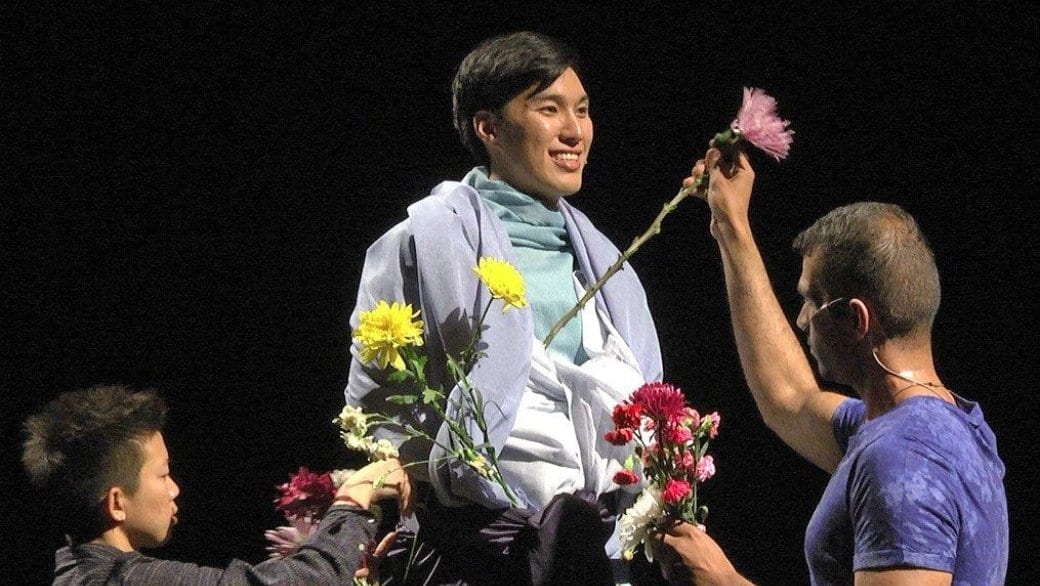I walked down Davie Street to the premiere of The Pink Line anticipating a series of angry monologues on the frustrations of racism, othering and cultural appropriation experienced by many queer and trans people of colour (QTIPOC) in Vancouver.
I was wrong.
From the moment the lights dimmed in the theatre to the final standing ovation, I was pleasantly surprised to find myself taken through a completely different experience.
The 20 short stories told by the four QTIPOC actors on stage were filled with love, hope and desires. I felt like I was eavesdropping on conversations between four people that I wish to be friends with, as they explored their own lives through lenses of respect and acceptance, rather than anger and frustration.
“I’m telling stories to my friends,” Jahanzeb Kazi, one of the actors, said during the talk-back that followed the show. “I cannot be angry at my friends. I can find it in my heart to tell those stories of sadness through humour and love.”
Rather than comparing the lived experiences of QTIPOC folks with those of white community members, these stories offered in-depth looks into the personal struggles and challenges the actors face, as they try to navigate the intersectionality of being queer and being a person of colour.
There is a reason why this intersectionality matters in telling these stories, Dora Ng said, as they answered questions after the show.
“Our experiences are different, and through the writing process we managed to tell stories that are personal and deep for us,” said Ng, who uses the pronoun they.

(Dora Ng presents “Bedtime Stories” in The Pink Line./Chris Randle/Frank Theatre)
In “Bedtime Stories,” Ng lovingly described their relationship with their grandfather, the bedtime stories he used to read about well-behaved children, their close relationship and the special place they have in each other’s hearts.
Ng clearly cares for their grandfather and values his love — “. . . and that’s why I cannot tell him that I’m queer,” they concluded, as the lights dimmed in the theatre and the audience grew silent.
“Your Body Feels Like Home,” a short monologue delivered beautifully by Jotika Chaudhary, explored the depth of love Chaudhary has for her partner. She narrated the curves of her partner’s body, and the depth of her lover’s mind. She told stories about the safety she feels in her partner’s arms, and the playfulness as they bicker over who is going to do the dishes, as two QTIPOCS in love.
In “He, The Boy,” Johnny Wu stood silently on top of a box, a fake smile plastered upon his face as the narrator recalled Wu’s attempts to respect his own culture: he feels empty, like a vase, filled by the hopes and dreams of others around him. He is motionless, while others control his limbs, and empty their own stereotypes and expectations within him.
Watching the actors’ authentic explorations of their own personal stories, as they seek balance between different cultures, allowed me to look within myself to explore my own life, and the balances I’ve been trying to find, between holding tight to relationships I care for while struggling to be my true self.
One of my favourite parts of The Pink Line was its improvised dinner scene, where the actors ate cake together, made jokes, laughed loudly and shared ideas about unceded territories, among other topics. Their conversation was cut short by the arrival of Matthew (a white gay man dating a person of colour), played by no one.

(Jahanzeb Kazi, Jotika Chaudhary, Johnny Wu and Dora Ng in the dinner table scene in The Pink Line./Chris Randle/Frank Theatre)
As soon as Matthew’s presence joined the table, the tone of the conversation shifted.
Suddenly, a space shared just moments ago by friends, now deferred to an invisible white person, who spoke, interrupted and took power away from others. Matthew became the focus of the conversation, while the voices of people of colour were reduced to humming in agreement or asking follow-up questions.
The stories in The Pink Line are all based on true life, Wu later said at the talk-back.
The dinner table scene was based on the participants’ experience at the Frank Theatre workshop that launched this project. The actors noticed a clear difference in tone when only people of colour were gathered around the workshop table, compared to when white folks joined them, which really altered the dynamic, Wu said.
Similarly, a disinterested “white” voice begins the story in “Speed Date,” by Anoushka Ratnarajah, who appears in the video only as a backdrop. She rolls her eyes, laughs sarcastically, and mumbles a few words, but we don’t hear her. Instead, we hear a series of common questions and statements that people of colour hear all too often when they’re on a date:
“Where are you from? No, I mean, where are you really from?”
“Your country is so homophobic.”
“Are you out to your family? You have to come out to your family! You won’t be happy until you come out! You have to.”
“I heard about those honour killings! They are so gross!”
“Do you know my friend, so-and-so?! You have to meet her! She is also from your country. I’m sure you’ll hit it off right away.”
The Pink Line offered me passage to an inner place in the actors’ and writers’ souls, and it echoed within an inner part of my own soul. We come from different backgrounds, but we experience life in similar fashions. It connected me to a community I know I belong to, and allowed me to realize that my struggles as a person of colour in a white-centric community may be unique, but they are also common.


 Why you can trust Xtra
Why you can trust Xtra


